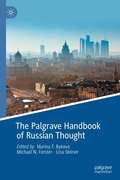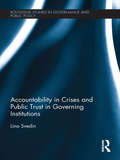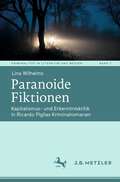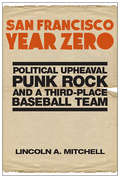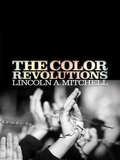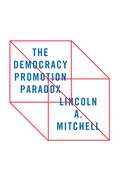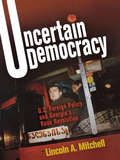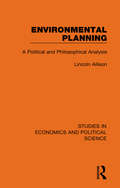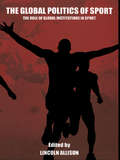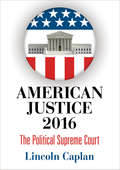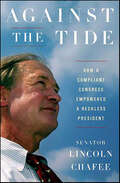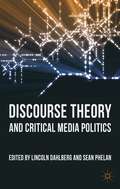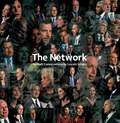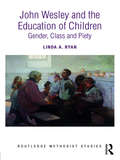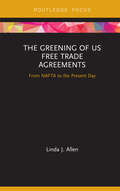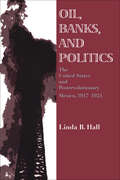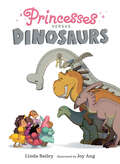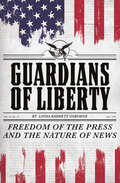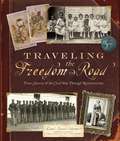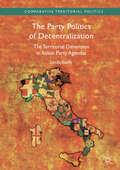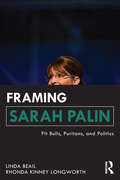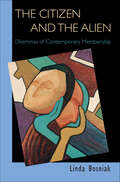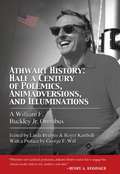- Table View
- List View
The Palgrave Handbook of Russian Thought
by Michael N. Forster Lina Steiner Marina F. BykovaThis volume is a comprehensive Handbook of Russian thought that provides an in-depth survey of major figures, currents, and developments in Russian intellectual history, spanning the period from the late eighteenth century to the late twentieth century. Written by a group of distinguished scholars as well as some younger ones from Russia, Europe, the United States, and Canada, this Handbook reconstructs a vibrant picture of the intellectual and cultural life in Russia and the Soviet Union during the most buoyant period in the country's history. Contrary to the widespread view of Russian modernity as a product of intellectual borrowing and imitation, the essays collected in this volume reveal the creative spirit of Russian thought, which produced a range of original philosophical and social ideas, as well as great literature, art, and criticism. While rejecting reductive interpretations, the Handbook employs a unifying approach to its subject matter, presenting Russian thought in the context of the country's changing historical landscape. This Handbook will open up a new intellectual world to many readers and provide a secure base for its further exploration.
Accountability in Crises and Public Trust in Governing Institutions (Routledge Studies in Governance and Public Policy)
by Lina SvedinThis book examines how efforts to exert accountability in crises affect public trust in governing institutions. Using Sweden as the case study, this book provides a framework to analyse accountability in crises and looks at how this affects trust in government. Crises test the fabric of governing institutions. Threatening core societal values, they force elected officials and public servants to make consequential decisions under pressure and uncertainty. Public trust in governing institutions is intrinsically linked to the ability to hold decision-makers accountable for the crucial decisions they make. The book presents empirical evidence from examination of the general bases for accountability in public administration, and at the accountability mechanisms of specific administrative systems, before focusing on longer term policy changes. The author finds that within the complex web of bureaucratic and political moves democratic processes have been undermined across time contributing to misplaced and declining trust in governing institutions. Accountability in Crises and Public Trust in Governing Institutions will be of interest to students, scholars and practitioners of public policy, political leadership and governance.
Paranoide Fiktionen: Kapitalismus- und Erkenntniskritik in Ricardo Piglias Kriminalromanen (Kriminalität in Literatur und Medien #7)
by Lina WilhelmsRicardo Piglias Kriminalromane haben das Genre kritisch beleuchtet und erneuert. Die Untersuchung kapitalismus- und erkenntniskritischer Perspektiven in Plata quemada, Blanco nocturno und El camino de Ida verbindet literaturtheoretische mit -historischen Reflexionen. Ausgehend von der These, dass die bürgerlich-kapitalistische Gesellschaft sowie Diskurse um Aufklärung und Positivismus zentrale Entstehungsbedingungen des Kriminalromans sind, wird nach den Möglichkeiten und Grenzen ihrer Kritik sowie einer dem Genre inhärenten Dialektik gefragt. Mithilfe marxistischer und poststrukturalistischer Ansätze werden Piglias Romane vor dem Hintergrund des argentinischen Kontexts als postmoderne littérature engagée analysiert.Die Arbeit wurde 2023 mit dem Elise Richter-Preis des Deutschen Romanistenverbands ausgezeichnet.
San Francisco Year Zero: Political Upheaval, Punk Rock and a Third-Place Baseball Team
by Lincoln A. MitchellSan Francisco is a city of contradictions. It is one of the most socially liberal cities in America, but it also has some of the nation’s worst income inequality. It is a playground for tech millionaires, with an outrageously high cost of living, yet it also supports vibrant alternative and avant-garde scenes. So how did the city get this way? In San Francisco Year Zero, San Francisco native Lincoln Mitchell traces the roots of the current situation back to 1978, when three key events occurred: the assassination of George Moscone and Harvey Milk occurring fewer than two weeks after the massacre of Peoples Temple members in Jonestown, Guyana, the explosion of the city’s punk rock scene, and a breakthrough season for the San Francisco Giants. Through these three strands, Mitchell explores the rifts between the city’s pro-business and progressive-left politicians, the emergence of Dianne Feinstein as a political powerhouse, the increasing prominence of the city’s LGBT community, punk’s reinvigoration of the Bay Area’s radical cultural politics, and the ways that the Giants helped unify one of the most ethnically and culturally diverse cities in the nation. Written from a unique insider’s perspective, San Francisco Year Zero deftly weaves together the personal and the political, putting a human face on the social upheavals that transformed a city.
The Color Revolutions
by Lincoln A. MitchellFrom late 2003 through mid-2005, a series of peaceful street protests toppled corrupt and undemocratic regimes in Georgia, Ukraine, and Kyrgyzstan and ushered in the election of new presidents in all three nations. These movements--collectively known as the Color Revolutions--were greeted in the West as democratic breakthroughs that might thoroughly reshape the political terrain of the former Soviet Union.But as Lincoln A. Mitchell explains in The Color Revolutions, it has since become clear that these protests were as much reflections of continuity as they were moments of radical change. Not only did these movements do little to spur democratic change in other post-Soviet states, but their impact on Georgia, Ukraine, and Kyrgyzstan themselves was quite different from what was initially expected. In fact, Mitchell suggests, the Color Revolutions are best understood as phases in each nation's long post-Communist transition: significant events, to be sure, but far short of true revolutions.The Color Revolutions explores the causes and consequences of all three Color Revolutions--the Rose Revolution in Georgia, the Orange Revolution in Ukraine, and the Tulip Revolution in Kyrgyzstan--identifying both common themes and national variations. Mitchell's analysis also addresses the role of American democracy promotion programs, the responses of nondemocratic regimes to the Color Revolutions, the impact of these events on U.S.-Russian relations, and the failed "revolutions" in Azerbaijan and Belarus in 2005 and 2006.At a time when the Arab Spring has raised hopes for democratic development in the Middle East, Mitchell's account of the Color Revolutions serves as a valuable reminder of the dangers of confusing dramatic moments with lasting democratic breakthroughs.
The Democracy Promotion Paradox
by Lincoln A. MitchellExplore the numerous paradoxes at the heart of the theory and practice of democracy promotion. The Democracy Promotion Paradox raises difficult but critically important issues by probing the numerous inconsistencies and paradoxes that lie at the heart of the theory and practice of democracy promotion. For example, the United States frequently crafts policies to encourage democracy that rely on cooperation with undemocratic governments; democracy promoters view their work as minor yet also of critical importance to the United States and the countries where they work; and many who work in the field of democracy promotion have an incomplete understanding of democracy. Similarly, in the domestic political context, both left and right critiques of democracy promotion are internally inconsistent.Lincoln A. Mitchell provides an overview of the origins of U.S. democracy promotion, analyzes its development and evolution over the last decades, and discusses how it came to be an unquestioned assumption at the core of U.S. foreign policy. His discussion of the bureaucratic logic that underlies democracy promotion offers important insights into how it can be adapted to remain effective. Mitchell also examines the future of democracy promotion in the context of evolving U.S. domestic policy and politics and in a changed global environment in which the United States is no longer the hegemon.
Uncertain Democracy
by Lincoln A. MitchellIn November of 2003, a stolen election in the former Soviet republic of Georgia led to protests and the eventual resignation of President Eduard Shevardnadze. Shevardnadze was replaced by a democratically elected government led by President Mikheil Saakashvili, who pledged to rebuild Georgia, orient it toward the West, and develop a European-style democracy. Known as the Rose Revolution, this early twenty-first-century democratic movement was only one of the so-called color revolutions (Orange in Ukraine, Tulip in Kyrgyzstan, and Cedar in Lebanon). What made democratic revolution in Georgia thrive when so many similar movements in the early part of the decade dissolved?Lincoln A. Mitchell witnessed the Rose Revolution firsthand, even playing a role in its manifestation by working closely with key Georgian actors who brought about change. In Uncertain Democracy, Mitchell recounts the events that led to the overthrow of Shevardnadze and analyzes the factors that contributed to the staying power of the new regime. The book also explores the modest but indispensable role of the United States in contributing to the Rose Revolution and Georgia's failure to live up to its democratic promise.Uncertain Democracy is the first scholarly examination of Georgia's recent political past. Drawing upon primary sources, secondary documents, and his own NGO experience, Mitchell presents a compelling case study of the effect of U.S. policy of promoting democracy abroad.
Environmental Planning: A Political and Philosophical Analysis (Studies in Economics and Political Science)
by Lincoln AllisonOriginally published in 1975, this was an entirely new approach to the study of environmental planning and problems. Planning had hitherto been generally described as a technical exercise, involving the solving of biological and economic problems. In Environmental Planning: A Political and Philosophical Analysis it is seen as an ideological activity and the development of planning in Britain and the nature of contemporary environment problems are analysed in terms of social and political theory. The book discusses the nature of ‘planning’, its relationship to ‘politics’ and examines the groups and ideas which had been instrumental in its development. It tries to determine how important the environment is to people and how decisions affecting planning are made. In particular it looks at the theories and assumptions behind environmental policy, suggests alternatives and describes the role played by ‘participation’ and pressure groups in influencing planning in Britain at the time.
The Global Politics of Sport: The Role of Global Institutions in Sport (Sport in the Global Society)
by Lincoln AllisonSport presents one of the most advanced cases of 'globalisation,' arguably because there are fewer cultural and political obstacles to the development of trade and international power in sport than there are in other fields. Thus there has been a change in the nature of the politics of sport since the end of the Cold War; the subject must be rewritten to acknowledge a twenty-first century world in which international sporting organisations and transnational corporations have become far more important than states.The Global Politics of Sport presents a range of essays examining the emerging global political issues in twenty-first century sport including: · The role, and power of organisations such as FIFA and the IOC· The influence of US exceptionalism · The construction of global sports heroes· Tensions developing within traditionally 'alternative' sports in a global commercial cultureThe Global Politics of Sport presents new and fresh exploration of different conceptions of sport as a purely commercial activity and as an activity as embodying 'higher' social and ethical values.
American Justice 2016: The Political Supreme Court
by Lincoln CaplanWhen the Democrat-appointed Justice Ruth Bader Ginsburg criticized Republican presidential nominee Donald Trump, she triggered concerns about judicial ethics. But the political concerns were even more serious. The Supreme Court is supposed to be what Alexander Hamilton called "the least dangerous" branch of government, because it is the least political. Justices have lifetime appointments to ensure their "complete independence" when deciding cases and controversies. But in the Roberts Court's most contested and important rulings, it has divided along partisan lines for the first time in American history: Republican presidents appointed the conservatives, Democrats appointed the liberals. Justice Ginsburg's criticisms suggested that partisan politics drive the Court's most profound disagreements. Well-respected political science supports that view.Has this partisan turn made the Court less independent and less trustworthy than the nation requires? The term ending in 2016 included more decisions and developments in almost fifty years for analyzing this question. Among them were major cases about abortion rights, the death penalty, immigration, and other wedge issues, as well as the death of Justice Antonin G. Scalia, leaving the Court evenly divided between conservatives and liberals. Legal journalist Lincoln Caplan dissects the recent term, puts it in historical context, and recommends ways to strengthen trust in the Supreme Court as the pinnacle of the American constitutional system.
Against the Tide: How a Compliant Congress Empowered a Reckless President
by Lincoln ChafeeIn this smart, candid, and surprising political memoir, Lincoln Chafee offers a behind-the-scenes look at the first six years of the Bush Administration from the vantage point of one of the few Republican moderates in the Senate. When Senator Chafee (R-RI) went to Washington, he encountered a Republican Party drifting so far to the right it no longer stood for the mainstream principles that united Americans. Instead, under the direction of George W. Bush, the Party had fallen victim to extremism. In the face of this trend, Chafee stood fast as one of the most liberal Republicans in the Senate, seeking to cut across partisan lines at the very time that they threatened to irrevocably divide the nation. A political iconoclast, Chafee was the only Republican senator to have expressed support for same-sex marriage; the only Republican to vote in favor of reinstating the top federal tax rate on upper-income payers; the only Republican in the Senate to have voted against authorization of the use of force in Iraq; the only Republican to vote for the Levin-Reed amendment calling for a nonbinding timetable for a withdrawal of U.S. troops from Iraq; and the only Republican to vote against Supreme Court nominee Samuel Alito. Chafee favored increased federal funding for health care, supported affirmative action and gun control, supported women's reproductive rights, and endorsed federal funding for embryonic stem cell research. Sometimes referred to by conservatives as a RINO (Republican in Name Only), Chafee turns the tables on the right and asks why it has enabled Bush Jr. to pull the GOP and the nation away from traditional principles of fiscal conservatism, respect for our environment, and aversion to foreign entanglements. Unabashedly frank, Chafee's memoir recounts his political journey from small-town mayor to a voice crying from the congressional wilderness. He offers a forward-looking assessment of what comes next for the Republican and Democratic parties, and he also addresses the potential rise of a third party within the void created by bipartisan extremism. Most important, Chafee sounds a wake-up call to his Party, and to all Americans, by challenging our government to strive, as Abraham Lincoln once articulated, "to elevate the condition of men."
Discourse Theory and Critical Media Politics
by Lincoln Dahlberg Sean PhelanA systematic examination of the relationship between post-Marxist discourse theory and media studies. This volume interrogates discourse theory - as read via the work of Ernesto Laclau and Chantal Mouffe - through an engagement with major approaches to critical media politics and a range of issues in contemporary media politics.
The Network: Portrait Conversations
by Lincoln SchatzAs the nation grapples with some of the greatest developments and challenges to date, The Network presents a dynamic portrait of the people who help shape America's current technology, policy, and education. Drawing inspiration from Richard Avedon's 1976 photographic portfolio, The Family, The Network consists of generative video portraits of 100 entrepreneurs, industrialists, politicians, scientists, scholars, inventors, and other influential figures, some of whom may be household names and others who operate behind the scenes, who play pivotal roles shaping the history and daily workings of America. The project builds on aspects of portraitist Lincoln Schatz's earlier project, Esquire's Portrait of the 21st Century (National Portrait Gallery, Smithsonian Institution), taking a closer look at how the touchstones of America are created and preserved.
John Wesley and the Education of Children: Gender, Class and Piety (Routledge Methodist Studies Series)
by Linda A. RyanScholars have historically associated John Wesley’s educational endeavours with the boarding school he established at Kingswood, near Bristol, in 1746. However, his educational endeavours extended well beyond that single institution, even to non-Methodist educational programmes. This book sets out Wesley’s thinking and practice concerning child-rearing and education, particularly in relation to gender and class, in its broader eighteenth-century social and cultural context. Drawing on writings from Churchmen, Dissenters, economists, philosophers and reformers as well as educationalists, this study demonstrates that the political, religious and ideological backdrop to Wesley’s work was neither static nor consistent. It also highlights Wesley’s eighteenth-century fellow Evangelicals including Lady Huntingdon, John Fletcher, Hannah More and Robert Raikes to demonstrate whether Wesley’s thinking and practice around schooling was in any way unique. This study sheds light on how Wesley’s attitudes to education were influencing and influenced by the society in which he lived and worked. As such, it will be of great interest to academics with an interest in Methodism, education and eighteenth-century attitudes towards gender and class.
The Greening of US Free Trade Agreements: From NAFTA to the Present Day (Routledge Focus on Environment and Sustainability)
by Linda AllenThis book provides an up-to-date critical analysis of the integration of environmental policies into US free trade agreements. The work focuses on the evolution of the design of environmental policies and analyzes their effectiveness. Starting with the North American Free Trade Agreement (NAFTA) leading to the Trans-Pacific Partnership (TPP), the book examines the history of policy integration. In doing so, it provides an overview of the major trade-related environmental policies and presents empirical research on their effectiveness, a discussion of the continued demand for policy integration in light of the effectiveness, and recommendations for addressing shortcomings. The main objective of the book is to inform the ongoing policy debate over integration of environmental policies into trade agreements. The current renegotiation of NAFTA provides an opportune time for undertaking this critical review of trade-related environmental policies. As our understanding and knowledge of the environmental policies associated with US trade agreements, in particular for NAFTA, has grown significantly over the past twenty-five years, this book provides a timely and critical update for this policy debate. Students and scholars of environmental law, trade and economics, and specifically US trade, environmental policy and law will find this book of great interest.
Oil, Banks, and Politics: The United States and Postrevolutionary Mexico, 1917–1924
by Linda B. HallA study in conflict between a powerful industry and a struggling nation: “This fine monograph . . . addresses an important issue in Mexican history.” —The AmericasMexico was second only to the United States as the world’s largest oil producer in the years following the Mexican Revolution. As the revolutionary government became institutionalized, it sought to assure its control of Mexico’s oil resources through the Constitution of 1917, which returned subsoil rights to the nation. This comprehensive study explores the resulting struggle between oil producers, many of which were U.S. companies, and the Mexican government. Linda Hall goes beyond the diplomacy to look at the direct impact of a powerful, highly profitable foreign-controlled industry on a government and a nation trying to recover from a major civil war. She draws on extensive research in Mexican archives, including both government sources and the private papers of Presidents Alvaro Obregón and Plutarco Elías Calles, as well as U.S. government and private sources. In the wake of the North American Free Trade Agreement’s expansion of United States business ties to Mexico, this study of a crucial moment in U.S.-Mexican business relations will be of interest to a wide audience in business, diplomatic, and political history.
Oil, Banks, and Politics: The United States and Postrevolutionary Mexico, 1917–1924
by Linda B. HallA study in conflict between a powerful industry and a struggling nation: “This fine monograph . . . addresses an important issue in Mexican history.” —The AmericasMexico was second only to the United States as the world’s largest oil producer in the years following the Mexican Revolution. As the revolutionary government became institutionalized, it sought to assure its control of Mexico’s oil resources through the Constitution of 1917, which returned subsoil rights to the nation. This comprehensive study explores the resulting struggle between oil producers, many of which were U.S. companies, and the Mexican government. Linda Hall goes beyond the diplomacy to look at the direct impact of a powerful, highly profitable foreign-controlled industry on a government and a nation trying to recover from a major civil war. She draws on extensive research in Mexican archives, including both government sources and the private papers of Presidents Alvaro Obregón and Plutarco Elías Calles, as well as U.S. government and private sources. In the wake of the North American Free Trade Agreement’s expansion of United States business ties to Mexico, this study of a crucial moment in U.S.-Mexican business relations will be of interest to a wide audience in business, diplomatic, and political history.
Princesses Versus Dinosaurs
by Linda BaileyTwo popular storybook titans, princesses and dinosaurs, battle to determine who should star in this laugh-out-loud picture book for fans of Shark vs Train and The Book With No Pictures.This is a princess book!No, it's a dinosaur book!No, it's . . . a T. rex book? A dragon book? A rubber ducky book?!From Linda Bailey, award-winning and critically acclaimed author, and Joy Ang, Adventure Time-artist and illustrator of the Mustache Baby series, comes an irresistibly irreverent picture book in which plucky princesses and determined dinosaurs have a battle royale over whose book this is. When they start calling in the big guns -- or rather, the big carnivores -- and decide to build a wall to resolve their differences, princesses and dinosaurs alike learn a thing or two about open-mindedness and sharing.
Guardians of Liberty: Freedom of the Press and the Nature of News
by Linda Barrett OsborneThis illustrated introduction to the crucial role of First Amendment rights and press freedom “enlightens and entertains readers of any age” (Michael Dirda, Pulitzer Prize-winning Washington Post critic). Guardians of Liberty explores the essential and basic American ideal of freedom of the press. Allowing the American press to publish—even if what they’re reporting is contentious— without previous censure or interference by the federal government was so important to the Founding Fathers that they placed a guarantee in the First Amendment to the Constitution. Citing numerous examples from America’s past, from the American Revolution to the Vietnam War and the Civil Rights Movement to Obama’s and Trump’s presidencies, Linda Barrett Osborne shows how freedom of the press has played an essential role in the growth of this nation, allowing democracy to flourish. She further discusses how the freedoms of press and speech often work side by side, reveals the diversity of American news, and explores why freedom of the press is still imperative to uphold today. “Nine chapters cover everything from the partisan press in Colonial and Revolutionary America to the incendiary rise of ‘fake news.’ . . . solid research and an engaging structure.” —School Library Journal“An excellent foray into the hows and whys of U.S. press freedom, beginning just prior to nationhood . . . Timely, essential reading.”?Kirkus Reviews (starred review)Includes endnotes, bibliography, and index
Traveling the Freedom Road: From Slavery and the Civil War Through Reconstruction
by Linda Barrett OsborneIn association with the Library of Congress. From the perspective of those who lived through a time of pain, strife, and hope comes a powerful message for Black History Month and all year long. Told through unforgettable first-person accounts from slave narratives, journals, diaries, and other sources--much of it never before published for young people--this book is an overview of the antebellum South, the Civil War, and Reconstruction, 1800 to 1877. The perspectives of children and adults who lived through this time and witnessed its significant events are provided alongside photographs, engravings, news clippings, and other archival material held in the collections of the Library of Congress, and offer a poignant message for readers. A bibliography and an index round out the many offerings of this important addition to black history books for young readers.
The Party Politics of Decentralization: The Territorial Dimension in Italian Party Agendas (Comparative Territorial Politics)
by Linda BasileThis book addresses the process of decentralization in Italy, examined from the perspective of political parties. In particular, it assesses whether and to what extent the dynamics of party competition are likely to shape policy agenda and affect policy change. The author starts by providing a thorough account of the process and history of Italian decentralization and the policy outcomes achieved over time, before discussing how party attention to an issue triggers related policy changes (manipulation of salience). Next, the focus shifts to the concrete positions adopted by parties on decentralization to assess whether the pattern of party competition has been consensual or adversarial, and how this pattern influenced the process of reform (manipulation of position). Finally, the author examines the role of frames in party competition. This volume offers essential research that will prove useful to a variety of audiences, ranging from scholars of territorial and Italian politics to those interested in agenda-setting, policy change, and party politics.
Framing Sarah Palin: Pit Bulls, Puritans, and Politics
by Linda Beail Rhonda Kinney LongworthSarah Palin’s 2008 vice presidential candidacy garnered tremendous levels of interest, polarizing the American public—both Democrats and Republicans alike. While many have wondered who she "really" is, trying to cut through the persona she projects and the one projected by the media, Beail and Longworth analyze why she touches such a nerve with the American electorate. Why does she ignite such passionate loyalty – and such loathing? How did her candidacy mobilize new parts of the electorate? Using the notion of "framing" as a way of understanding political perception, the authors analyze the narratives told by and about Sarah Palin in the 2008 election – from beauty queen, maverick, faithful fundamentalist and post-feminist role model to pit bull hockey mom, frontier woman, and political outsider. They discuss where those frames are rooted historically in popular and political culture, why they were selected, and the ways that the frames resonated with the electorate. Framing Sarah Palin addresses the question of what the choice and perception of these frames tells us about the state of American politics, and about the status of American women in politics in particular. What do the debates engendered by these images of Palin say about the current roles and power available to women in American society? What are the implications of her experience for future candidates, particularly women candidates, in American politics?
Richard Sopris in Early Denver: Captain, Mayor & Colorado Fifty-Niner
by Linda BjorklundFrom Gregory's Diggings prospector to Denver mayor, Richard Sopris left an indelible mark on the Mile High City and Centennial State. During an 1860 prospecting expedition, Sopris discovered Glenwood Springs and the nearly thirteen-thousand-foot summit later named for him. Following life as a steamboat captain, he was appointed captain of Company C, First Colorado Cavalry, in 1861 and commanded volunteer troops at Glorieta Pass. After serving as a delegate to the first constitutional convention of Colorado and as Arapaho County sheriff, he helped quell the Hop Alley Chinese Riot of 1880 and enacted public works projects to rid Denver of a deadly typhoid outbreak. After his mayoral term ended in 1881, Sopris became the first commissioner of his beloved City Park. Author Linda Bjorklund celebrates the unsung life and accomplishments of a founding son of Colorado.
The Citizen and the Alien: Dilemmas of Contemporary Membership
by Linda BosniakCitizenship presents two faces. Within a political community it stands for inclusion and universalism, but to outsiders, citizenship means exclusion. Because these aspects of citizenship appear spatially and jurisdictionally separate, they are usually regarded as complementary. In fact, the inclusionary and exclusionary dimensions of citizenship dramatically collide within the territory of the nation-state, creating multiple contradictions when it comes to the class of people the law calls aliens--transnational migrants with a status short of full citizenship. Examining alienage and alienage law in all of its complexities, The Citizen and the Alien explores the dilemmas of inclusion and exclusion inherent in the practices and institutions of citizenship in liberal democratic societies, especially the United States. In doing so, it offers an important new perspective on the changing meaning of citizenship in a world of highly porous borders and increasing transmigration. As a particular form of noncitizenship, alienage represents a powerful lens through which to examine the meaning of citizenship itself, argues Linda Bosniak. She uses alienage to examine the promises and limits of the "equal citizenship" ideal that animates many constitutional democracies. In the process, she shows how core features of globalization serve to shape the structure of legal and social relationships at the very heart of national societies.
Athwart History: Half a Century of Polemics, Animadversions, and Illuminations
by William F. Buckley Jr. Roger Kimball Linda BridgesFor most of the last century, William F. Buckley Jr. was the leading figure in the conservative movement in America. The magazine he founded in 1955, National Review, brought together writers representing every strand of conservative thought, and refined those ideas over the decades that followed. Buckley's own writings were a significant part of this development. He was not a theoretician but a popularizer, someone who could bring conservative ideas to a vast audience through dazzling writing and lively wit.Culled from millions of published words spanning nearly sixty years, Athwart History: Half a Century of Polemics, Animadversions, and Illuminations offers Buckley's commentary on the American and international scenes, in areas ranging from Kremlinology to rock music. The subjects are widely varied, but there are common threads linking them all: a love for the Western tradition and its American manifestation; the belief that human beings thrive best in a free society; the conviction that such a society is worth defending at all costs; and an appreciation for the quirky individuality that free people inevitably develop.
